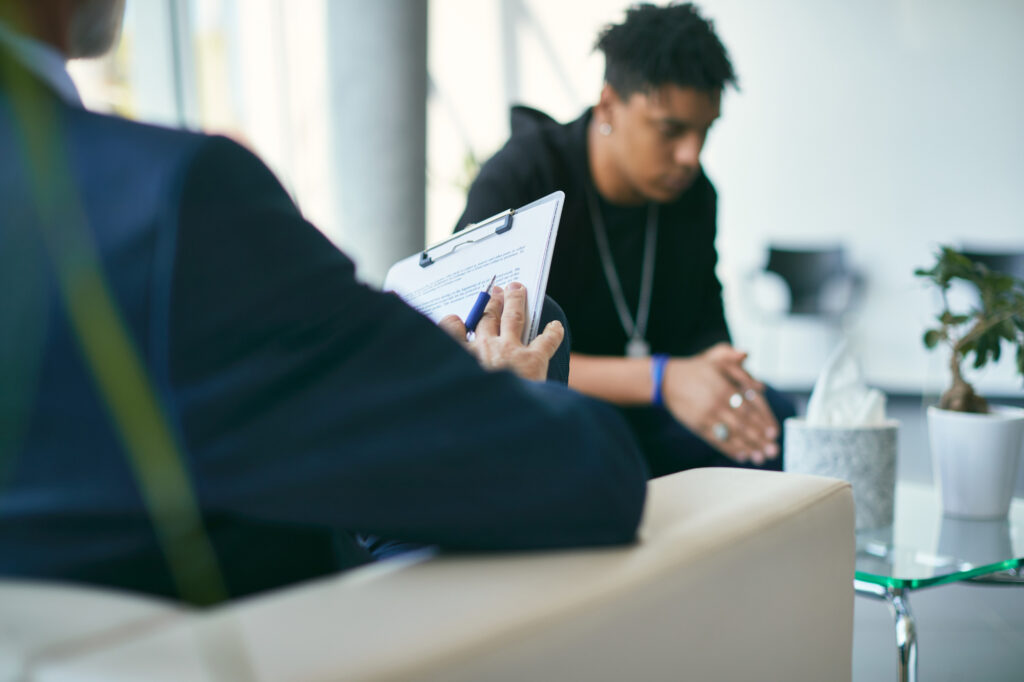
This series discusses teens with behavioral challenges. We’ve shared the causes of parental defiance and the co-occurring mental health issues that your teen might also be struggling with. Now, we’re going to talk about what treatment options are available—for your teen.
Treatment for teens with behavioral challenges usually involves a multi-faceted approach. This can include a combination of individual and family therapy, social skills training, medication, or treatment for co-occurring disorders.
Treatment for Teens with Behavioral Issues
1. Individual therapy
A teen who has severe behavioral challenges often needs professional support. Whether it’s oppositional-defiant disorder (ODD), disruptive mood dysregulation disorder (DMDD), attention-deficit hyperactivity disorder (ADHD) or otherwise, they need to learn effective problem-solving skills and find healthy ways to manage and express negative emotions.
Behavior therapy, dialectical behavior therapy (DBT), and cognitive behavioral therapy (CBT) are hallmark approaches for reducing the frequency and intensity of conduct behaviors. Behavior therapy can help teens unlearn problem behaviors. CBT can help teens recognize and change negative thought patterns and distorted beliefs that play a role in their defiant behavior. DBT focuses on changing problematic actions using specific, practical skills. DBT therapists focus on distress tolerance, interpersonal effectiveness, emotion regulation, and mindfulness. A therapist who specializes in ODD, DMDD, borderline personality disorder (BPD), or ADHD will have the experience and knowledge to treat your teen.
All adolescent residential treatment centers (RTC), partial hospitalization programs (PHP), and intensive outpatient programs (IOP) incorporate individual therapy into the weekly treatment schedule.
2. Family Therapy
Teens with behavioral issues like ODD and DMDD can have a highly negative impact on the entire family. That’s why family therapy, in addition to individual therapy, is essential. Family therapy can help create a healthier and more supportive home environment. Family members learn ways to communicate more effectively, set limits and boundaries, and develop more empathy and respect for others. A family therapist helps everyone develop healthier coping skills and interact with each other in more positive ways. Family therapy sessions can include the teen, their parents, and siblings (at times). Most teen residential treatment centers (RTC), partial hospitalization programs (PHP) and intensive outpatient programs (IOP) incorporate family therapy into the weekly treatment schedule. In these adolescent mental health programs, family therapy is an essential component of treatment.
3. Medication
The issue of medication is complicated when it comes to behavioral issues in teens. Medication is not always necessary or recommended. It depends on the diagnosis and the presence of co-occurring disorders. For example, if a teen has ODD, medication is not usually prescribed unless their conduct issues are particularly distressing and disruptive. ODD and DMDD often go hand in hand with ADHD, depression or anxiety. And all may warrant medication in combination with other forms of treatment (DBT, CBT, etc.) The three most common categories of medication used for DMDD are stimulants, antidepressants, and antipsychotics.
4. Social Skills
If a teen has a serious behavioral challenge like DMDD, it’s hard for them to interact pleasantly with everyone in their lives. It’s not just their parents. They struggle with social interactions everywhere, not just at home but also in school. Because they have trouble managing their anger, they often have conflicts and get into fights with teachers, classmates and peers. That’s why social skills training can be so beneficial for these teens. Adolescents learn and practice healthy, effective ways to interact with friends, family members, parents, and even strangers on the street.
5. Residential Treatment
If behavioral issues are so intense a teen is a danger to themselves or others, they probably need full-time treatment at an adolescent residential treatment center. A mental health or dual diagnosis treatment center will offer an immersive, all-inclusive treatment experience. Teens receive individual therapy, family therapy, group therapy (such as a DBT Skills Group), social skills training, psychiatry sessions if needed, and experiential therapies. Many experiential therapies are evidence-based to promote wellbeing and reduce aggressiveness, such as equine-assisted therapy, surf therapy, mindfulness-based hiking, yoga, fitness, art therapy, music therapy, and more.
Most RTCs also provide academic support so your teen doesn’t fall too far behind in school. Additionally, the RTC level allows for contingency management in teens with behavioral challenges. Staff expose teens to new limits, rules, and consequences and have them practice tolerating these new limits. (At the same time, parents need to receive training to learn how to set these same limits when their teen returns home.) Residential treatment often lasts between 30 to 60 days, depending on the severity of your teen’s conduct issues.
6. Partial Hospitalization
An adolescent Partial Hospitalization Program (PHP) is one step down from residential treatment and one step up from intensive outpatient. Teens in PHP are able to safely live at home at this point (though their behavioral challenges make it difficult for them to attend school). PHP also offers an immersive, all-inclusive treatment experience: individual therapy, family therapy, group therapy, social skills training, psychiatry sessions, and experiential therapies. Teens receive a full day of treatment in PHP: at least five hours per day, five days a week. Clinically, at this level of care, teens continue practicing their emotion regulation and distress tolerance skills while learning how to accept rules and consequences. PHPs also offer parental support. Multifamily groups and family therapy teaches parents how to set these same limits and consequences with their teens at home.
7. Intensive Outpatient
An Intensive Outpatient Program (IOP) is a less intensive option than PHP. At the IOP level, adolescents are able to attend school and safely live at home, so they receive a half day of professional treatment. Intensive outpatient is appropriate for teenagers who need more than just individual therapy for their behavioral issues. The number of hours in an Intensive Outpatient Program may vary. Generally, teens in IOP receive 3-4 hours of treatment up to four days a week. Treatment includes individual therapy, family therapy, group therapy, social skills training, psychiatry sessions, and experiential therapies. IOPs also incorporate multifamily groups and family therapy. These therapy sessions teach parents how to set firm boundaries and establish structure with their teens at home.
Integrated, Holistic Approach

A multi-pronged approach to treatment has the highest chances of success. In addition to teens getting treatment for their ODD, DMDD, ADHD, BPD, or other challenging behavior issues, parents also need to receive training or support. Our next article will outline the treatment parents can receive so they can do their part in helping resolve their teen’s behavioral challenges.
































































